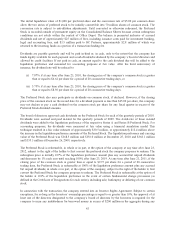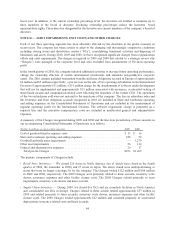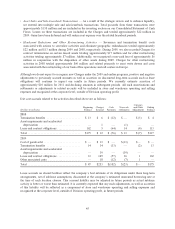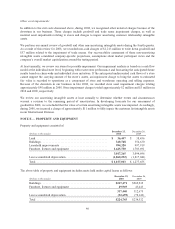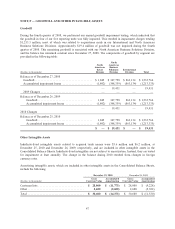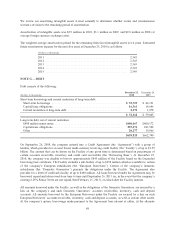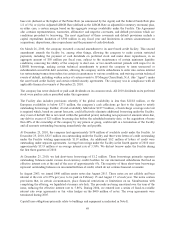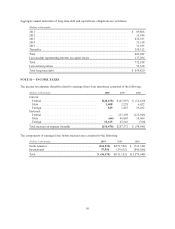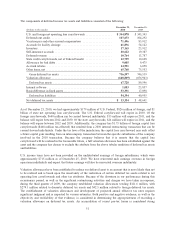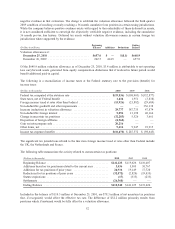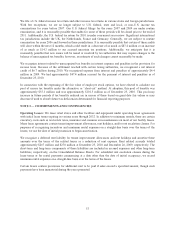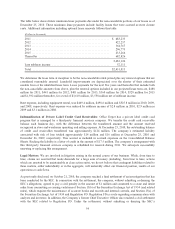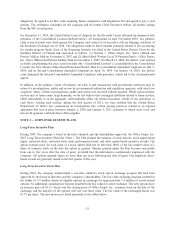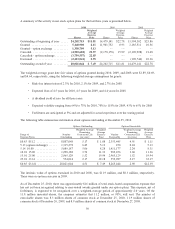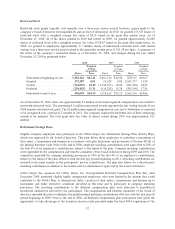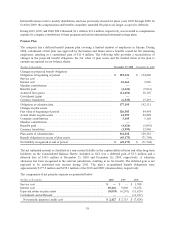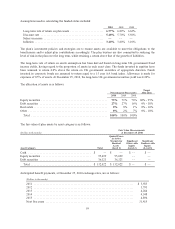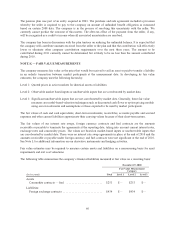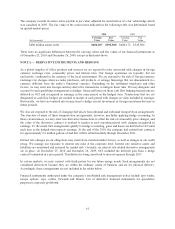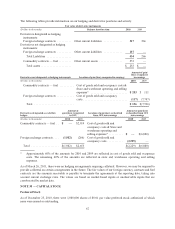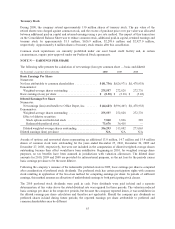Office Depot 2010 Annual Report Download - page 54
Download and view the complete annual report
Please find page 54 of the 2010 Office Depot annual report below. You can navigate through the pages in the report by either clicking on the pages listed below, or by using the keyword search tool below to find specific information within the annual report.We file a U.S. federal income tax return and other income tax returns in various states and foreign jurisdictions.
With few exceptions, we are no longer subject to U.S. federal, state and local, or non-U.S. income tax
examinations for years before 2007. Our U.S. federal filings for the years 2007 and 2009 are under routine
examination, and it is reasonably possible that audits for some of these periods will be closed prior to the end of
2011. Additionally, the U.S. federal tax return for 2010 is under concurrent year review. Significant international
tax jurisdictions include the UK, the Netherlands, France and Germany. Generally, we are subject to routine
examination for years 2006 and forward in these jurisdictions. It is reasonably possible that certain of these audits
will close within the next 12 months, which could result in a decrease of as much as $87.4 million or an increase
of as much as $14.3 million to our accrued uncertain tax positions. Additionally, we anticipate that it is
reasonably possible that new issues will be raised or resolved by tax authorities that may require changes to the
balance of unrecognized tax benefits, however, an estimate of such changes cannot reasonably be made.
We recognize interest related to unrecognized tax benefits in interest expense and penalties in the provision for
income taxes. Because of the settlement reached with certain taxing authorities, we recognized a net interest
credit of $6.7 million during 2010. We recognized expense from interest and penalties of approximately $4.4
million in 2009. We had approximately $47.4 million accrued for the payment of interest and penalties as of
December 25, 2010.
In connection with the expensing of the fair value of employee stock options, we have elected to calculate our
pool of excess tax benefits under the alternative or “short-cut” method. At adoption, this pool of benefits was
approximately $55.3 million and was approximately $101.5 million as of December 25, 2010. This pool may
increase in future periods if tax benefits realized are in excess of those based on grant date fair values or may
decrease if used to absorb future tax deficiencies determined for financial reporting purposes.
NOTE I — COMMITMENTS AND CONTINGENCIES
Operating Leases: We lease retail stores and other facilities and equipment under operating lease agreements
with initial lease terms expiring in various years through 2032. In addition to minimum rentals, there are certain
executory costs such as real estate taxes, insurance and common area maintenance on most of our facility leases.
Many lease agreements contain tenant improvement allowances, rent holidays, and/or rent escalation clauses. For
purposes of recognizing incentives and minimum rental expenses on a straight-line basis over the terms of the
leases, we use the date of initial possession to begin amortization.
We recognize a deferred rent liability for tenant improvement allowances and rent holidays and amortize these
amounts over the terms of the related leases as a reduction of rent expense. Rent related accruals totaled
approximately $267 million and $270 million at December 25, 2010 and December 26, 2009, respectively. The
short-term and long-term components of these liabilities are included in accrued expenses and other long-term
liabilities, respectively, on the Consolidated Balance Sheets. For scheduled rent escalation clauses during the
lease terms or for rental payments commencing at a date other than the date of initial occupancy, we record
minimum rental expenses on a straight-line basis over the terms of the leases.
Certain leases contain provisions for additional rent to be paid if sales exceed a specified amount, though such
payments have been immaterial during the years presented.
53


